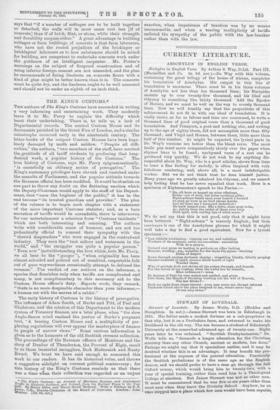THE KING'S CUSTOMS.*
THE authors of The King's Customs have succeeded in writing a very informing and entertaining work. They modestly leave it to Mr. Parry to explain the difficulty which beset their undertaking. There is, he tells us, a lack of Departmental records. The central Custom House and its
documents periehed in the Great Fire of London, and a similar catastrophe occurred early in the nineteenth century. The letter-books of the outport Custom Houses have been hope- lessly damaged by moth and mildew. "Despite all diffi- culties," the authors, "two members of the staff, have merited the gratitude of all tariff students by producing that long-
desired work, a popular history of the Customs." The true history of Customs, says Mr. Parry epigrammatically, "is essentially an obituary notice of prerogative." The King's customary privileges have shrunk and vanished under the assaults of Parliament, and the popular attitude towards the Revenue official has been modified. It would be churlish on our part to throw any doubt on the flattering unction which the Deputy-Chairman would apply to the staff of his Depart- ment, that "once the bugbear of the public,!' it has in the end become "its trusted guardian and provider." The plan of the volume is to begin each chapter with a statement of the more important Customs statutes; and, as a bare narration of tariffs would be unreadable, there is interwoven for our entertainment a selection from "Customs incidents" which are both interesting and amusing. The authors write with considerable sense of humour, and are not too pedantically official to conceal their sympathy with the " shrewd desperadoes" who were engaged in the contraband industry. They were the "best sailors and watermen in the world," and ," the smuggler was quite a popular person." "Even now" (notwithstanding the love which, tests Mr. Parry, we all bear to the "gauger"), "when originality has been almost schooled and policed out of mankind, respectable folk out of pure waywardness occasionally attempt to defraud the revenue." The verdict of our authors on the informer, a species that flourishes only when tariffs are complicated and many, is not complimentary to this necessary aid to the Custom House officer's duly. Expert° credo, they remark, "there is no more despicable character than your informer,— a human rat with the nerves of a rabbit."
The early history of Customs is the history of prerogative. The influence of Adam Smith, of Burke and Pitt, of Peel and Gladstone, and the relation of this Department to the modern system of Treasury finance, are a later phase, when "the slow Anglo-Saxon mind realised the justice of Burke's pregnant text, 'A teasing Custom House and a multiplicity of per- plexing regulations will ever appear the masterpiece of finance to people of narrow views.'" Some curious information is given as to the humours of the old Scottish revenue collection. The proceedings of the Revenue officers of Montrose and the story of Dunbar of Thunderton, the Provost of Elgin, recall to us those immortal smugglers, Durk Hatteraick and Nanty E wart. We trust we have said enough to commend this Work to our readers. It has its historical value, and throws a suggestive sidelight on current political controversy ; for this history of the King's Customs reminds us that there was a time wten their collection was regarded as an unjust The King's Customs: an Account of Maritime Revenue and Contraband l'raffir in England, Scotland, and Ireland,frorn this Earliest Times to tha Year 2800. By Henry Afton and Henry Hurst Holland. With a Preface by P. 3. tarry, LB., Deputy-Chairman of the Board of Customs, London; rohn ...furraY. [10e. Od, not.] exaction, when impatience of taxation was by no nueane unreasonable, and when a teasing multiplicity of tariffs enlisted the sympathy of the public with the law-breaker rather than with the law.
























































 Previous page
Previous page